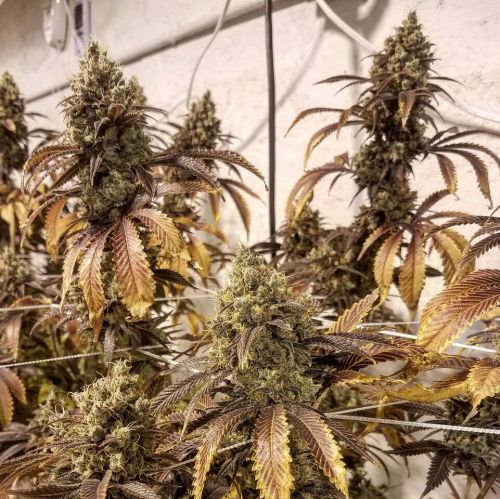News | September 21st, 2018

by Jacques Harvieux
jacquesthejock@gmail.com
With the creation of “North Dakotans Against the Legalization of Recreational Marijuana (NDALTLORM),” and after Norm Robinson and Bob Wefald’s interview with HPR another question was raised: who else are the members of this coalition?
Below is the list provided by the coalition’s webpage, which was just launched only a few days ago. At first glance there doesn’t seem to be anything afoul about the list, but 4 out of 18 of these groups are either in direct support or indirect support of the energy, more specifically the fossil fuel industry.
The question for any person, is most likely going to be, why?
The changes to the law that is provided in Measure 3 would make it very easy for farmers to grow all types of cannabis, cannabinoids, and plants containing THC. The change in law will also make it easier for said farmers to produce hemp, which is already legal.
Some of the organizations and companies that would be able to be created are biomass fuel and energy companies. A 1994 research article provided by the University of Auburn, Welcome to Frequently Asked Questions about Cannabis Hemp, explains the how and why.
“How can hemp be used as a fuel?
The pulp (hurd) of the hemp plant can be burned as is or processed into charcoal, methanol, methane, or gasoline. The process for doing this is called destructive distillation, or `pyrolysis.' Fuels made out of plants like this are called `biomass' fuels. This charcoal may be burned in today's coal-powered electric generators. Methanol makes a good automobile fuel, in fact it is used in professional automobile races. It may someday replace gasoline.
Hemp may also be used to produce ethanol (grain alcohol.) The United States government has developed a way to make this automobile fuel additive from cellulosic biomass. Hemp is an excellent source of high quality cellulosic biomass. One other way to use hemp as fuel is to use the oil from the hemp seed -- some diesel engines can run on pure pressed hemp seed oil. However, the oil is more useful for other purposes, even if we could produce and press enough hemp seed to power many millions of cars.
Why is it better than petroleum?
Biomass fuels are clean and virtually free from metals and sulfur, so they do not cause nearly as much air pollution as fossil fuels. Even more importantly, burning biomass fuels does not increase the total amount of carbon dioxide in the Earth's atmosphere. When petroleum products are burned, carbon that has been stored underground for millions of years is added to the air; this may contribute to global warming through the `Greenhouse Effect', (a popular theory which says that certain gases will act like a wool blanket over the entire Earth, preventing heat from escaping into space.) In order to make biomass fuels, this carbon dioxide has to be taken out of the air to begin with -- when they are burned it is just being put back where it started.
Another advantage over fossil fuels is that biomass fuels can be made right here in the United States, instead of buying them from other countries. Instead of paying oil drillers, super-tanker captains, and soldiers to get our fuel to us, we could pay local farmers and delivery drivers instead. Of course, it is possible to chop down trees and use them as biomass. This would not be as beneficial to the environment as using hemp, especially since trees that are cut down for burning are `whole tree harvested.' This means the entire tree is ripped up and burned, not just the wood. Since most of the minerals which trees use are in the leaves, this practice could ruin the soil where the trees are grown. In several places in the United States, power companies are starting to do this -- burning the trees in order to produce electricity, because that is cheaper than using coal. They should be using hemp, like researchers in Australia started doing a few years ago. (Besides, hemp provides a higher quality and quantity of biomass than trees do.)” - Welcome to Frequently Asked Questions about Cannabis Hemp
Four of the above groups are involved directly or indirectly with energy and fossil fuels; ND Petroleum Marketers Association, ND Petroleum Council, The Harms Group, and ND Retail Association. Two of these are obvious, but The Harms Group, and ND Retail Association standout among the four.
The Harms Group is an individual and corporate, oil and gas consulting firm in the Bakken. The website itself is bare, it’s just a picture of Robert Harms, and a phone and fax number. “Contact us today to see how Robert Harms and his unique set of skills and contacts can assist your company in succeeding in the oil, gas, or energy field.” Private consulting firms such as this have the ability to represent many private interests and funnel their assets into coalitions like NDATLORM.
The ND Retail Association at first glance would not seem to be a supporter of fossil fuel energy policies but a little digging shows that acting president, Mike Rud, is a Commission Member to EmPower North Dakota.
“In 2007, the North Dakota Legislature formalized energy policy and created the 16-member EmPower Commission. This group is charged with developing comprehensive energy policy recommendations for the state's diverse and growing energy industry. The commission is made up of representatives from all the state's energy industries and is a model of how differing interests can come together for the good of an industry.”- EmPower
It’s easy to see why big energy interests might feel threatened under the weight of legal marijuana, but with all the potential that cannabis and hemp have as a renewable biofuel it will be a tough topic for them to debate.
February 16th 2026
January 27th 2026
January 27th 2026
January 26th 2026
January 24th 2026

_(1)_(1)_(1)_(1)_(1)__293px-wide.jpg)

__293px-wide.jpg)
_(1)__293px-wide.jpg)
